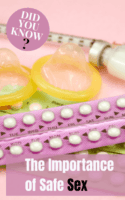From a young age, young girls are burdened with the idea that if they have sex they will get pregnant, they are taught to always remember, ‘Books before Boys Because Boys Bring Babies”, – the seven Bs. For some, this is the only sex education they will ever get from home. Traditionally, boys are encouraged to have sex with no education or warning whatsoever. In school, we have the subject, Life Orientation, a subject that was supposed to teach young people about safe sex but this space was often not well-utilised.
Personally, sex has always been a big fear because I grew up in a poor household and my mom was very clear that if I had a child at a young age, she would disown me. One thing that parents never talk about is safe sex – that time or age at which you can have sex so long as you do it ‘safely’, i.e. use contraception and are informed about all the options of contraceptives that are at your disposal.
Let’s be honest, even with the warnings, young people are having sex… but are they having it safe? That is the question. Contraceptives are not only about preventing an unplanned pregnancy but also all the diseases that can be transmitted through sex, which is why it’s important to use condoms even if you are on the pill or injection.
What is a contraceptive?
According to the Zazi Programme Guide Contraception is the word used to describe the prevention of pregnancy. Having sex isn’t an issue but if you are not ready to have children or want to prevent contracting HIV and other sexually transmitted infections (STIs), it’s best to use them. This is why it’s important to discuss with your partner an option that will work for both of you. It is also important to get tested for HIV and other STIs before even thinking about having sex with your partner.
Types of contraceptives
Male condom – The male condom is a covering made to fit over a man’s erect penis. Most condoms are made of latex rubber. Some condoms are coated with a dry lubricant or with spermicide. These you can find from your local stores, clinics, and facilities like university bathrooms.
Female condom – The female condom is a soft, polyurethane tube with one closed end and one open end. Both ends have a flexible ring or rim. The ring at the closed end is inserted deep into the vagina and rests over the cervix. The female condom is not always easy to find in stores, it’s best to do your research on where you can buy it.
Oral contraceptive pill – These pills contain hormones, which prevent the release of an egg from the ovary. The pill comes in a 28- or 21-day pack. Different types of the pill are available at local clinics and will be prescribed depending on the needs of the girl using it. Forgetting to take the pill, taking certain other medicines, and vomiting or having diarrhea after taking the pill may make it less effective in preventing pregnancy. If this happens, you will need to use condoms until after your next period, to make sure that you do not get pregnant.
Hormonal implants – These are small plastic capsules of hormones that are inserted under the skin by a healthcare provider. They are long-lasting and reliable and should be removed by a healthcare provider and replaced after five years, depending on the implant.
Sterilisation for women/ men – The sterilisation procedure for women is called tubal ligation. The fallopian tubes that carry the eggs from the ovaries to the uterus (womb) are tied or blocked. The sterilisation procedure for males is called a vasectomy, where one or two small openings are made in the skin near the testicles. The vas deferens (sperm tubes), which carry sperm from each testicle, are cut and tied. The sperm cannot pass to the penis and is reabsorbed by the body.
There are many types of contraceptives out there, some you can buy but if you can’t afford them just go to your local clinic.
Stereotypes surrounding sex and contraceptives in SA
According to the book Teenage Pregnancy in South Africa: A Challenge to Democracy, there are many reasons young people, in particular, have no access to information about contraceptives and sex. These are:
Gender Relations: a study conducted among youth in KwaZulu-Natal revealed that women were unable to negotiate sex and condom-use first at the risk of being called ‘easy’.
Family Planning Services: many clinics have female staff who focus on targeting females when it comes to family planning. But this shouldn’t be the case as men should also be educated about it.
Cultural Stereotypes: this one is still happening currently, girls are not supposed to show that they enjoy sex while boys are encouraged to have sex without risking being slut-shamed.
The attitude of healthcare staff: According to the book, sexuality is often excluded from teenagers implying that teenagers are not supposed to have sex. This has happened to me personally as well. Where the culture, religion and morality of the nurse were placed upon me because in her eyes young people are not supposed to seek information about anything related to sex.
Asking questions and researching is very important when it comes to a decision. Deciding to have sex is a big step that you need to be ready for so ask as much as you can. Be safe. Look for contraceptives that will be good for you physically and emotionally. Remember it’s your body and you have a choice to say yes or no – no matter what gender you are.
Want in-depth information about the types of contraceptives you can use? Read more here
***
Tell us: What important information did you get from this article?.


